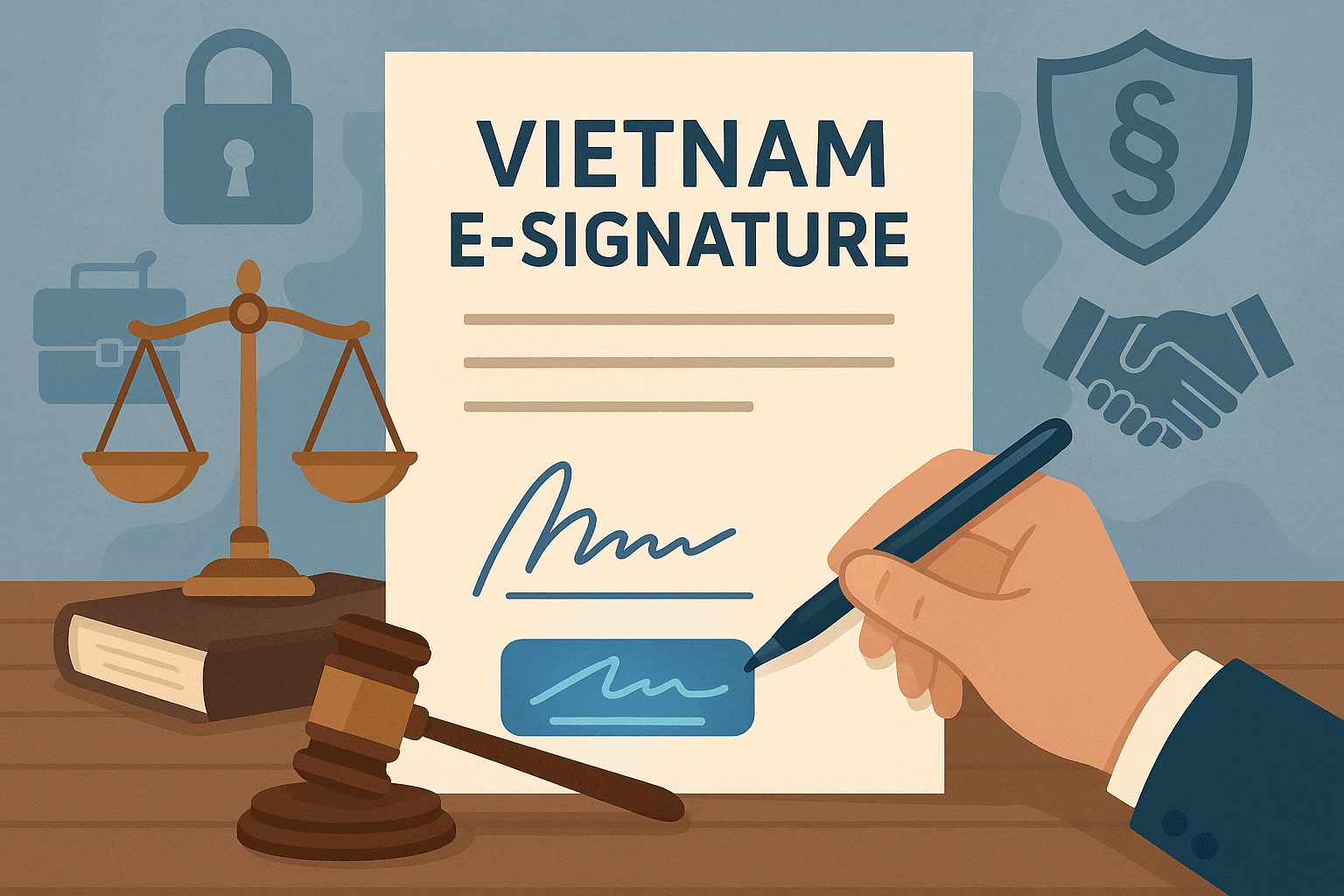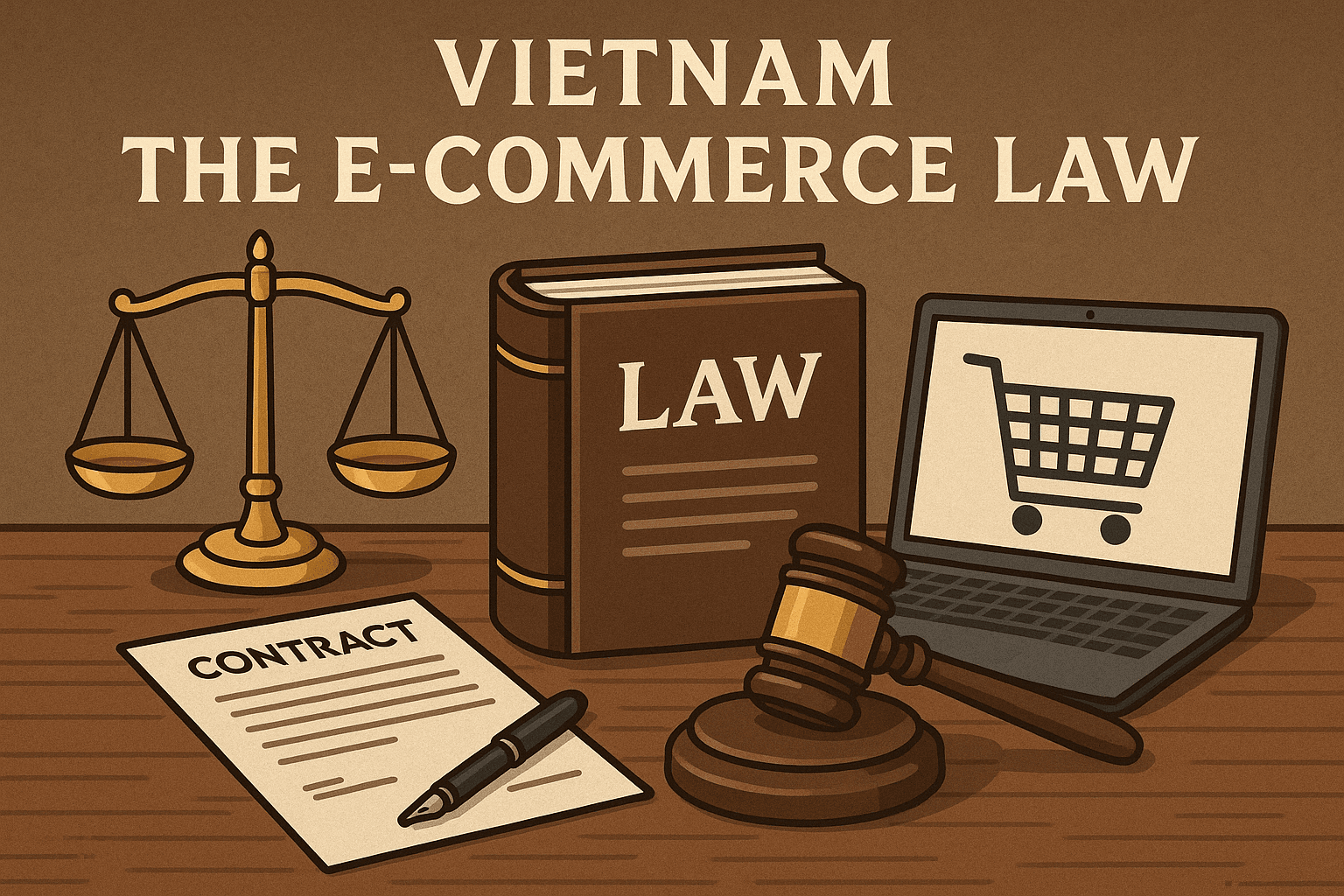WhatsApp or email with our sales team or get in touch with a business development professional in your region.
2025 Guide to Secure E-Signature Solutions for Vietnam Companies





The demand for reliable, secure, and regulation-compliant electronic signature solutions across Asia has surged amidst increasing digitalization. Whether it’s reducing contract turnaround time, achieving paperless workflows, or navigating complex legal regulations, organizations are under pressure to modernize how agreements are executed. Especially in Southeast Asia, where cross-border business partnerships are booming, the ability to ensure electronic signature legality under local laws has become a top priority.

Understanding eSignature: Legal and Technical Fundamentals
An electronic signature, legally defined, refers to any electronic means that indicates acceptance of an agreement or a record. However, the term encompasses several layers: from simple typed names to advanced digital signatures that use cryptographic methods. According to the Vietnam E-COMMERCE LAW (No.20/2023/QH15, known as the “ET Act”) and reinforced by Decree No.130/2018/ND-CP, only digital signatures issued via a licensed Certificate Authority (CA) and protected through Public Key Infrastructure (PKI) technology are considered legally binding in most commercial and governmental transactions.
The ET Act draws standards from international frameworks while enforcing localized compliance through national certification bodies. Trust service providers must be accredited by the Ministry of Information and Communications or appointed local supervisory entities. This legal clarity allows businesses to adopt eSignature platforms, provided they comply with digital identity verification, tamper-proof encryption, and audit trails.

Asia’s eSignature Landscape: Growth Backed by Real Demand
MarketsandMarkets projects the global digital signature market to reach $25.2 billion by 2025, growing at a CAGR of 31%. Asia-Pacific is emerging as the fastest-growing region, with Southeast Asia—particularly Vietnam, Indonesia, and the Philippines—showing above-average adoption. Regulatory clarity, mobile-first business infrastructure, and cross-border data compliance are driving this acceleration.
Gartner’s 2023 report on Enterprise Application Software Trends emphasized Southeast Asia’s focus on trusted digital identity systems and eSignature readiness, making the region a hotbed for niche providers tailored to local specifics. New players are entering the top ten eSignature providers list for the first time—a sign that the market is evolving beyond just global giants.
Security and Legal Compliance: Beyond Basic Signatures
True enterprise-grade eSignature solutions leverage advanced cryptographic technologies. Central to their architecture is Public Key Infrastructure (PKI), which uses asymmetric cryptography (public and private keys) to ensure biometric-level data integrity. Digital signatures are validated via time stamps and certificate chains tied to a registered Certificate Authority (CA), making them non-repudiable.
Further, compliance with regional laws like the ET Act in Vietnam or Malaysia’s Digital Signature Act requires not just encryption, but digital identity verification, server data residency, and local language templates. For cross-border contracts, some providers also integrate eIDAS or compliance overlays with ISO 27001, SOC 2 or GDPR frameworks—depending on the contracting parties’ jurisdictions.
Leading eSignature Solutions for 2025: Comparative Overview
eSignGlobal: A Rising Asian Force
Positioned as Asia’s technology-driven alternative to both DocuSign and Adobe Sign, eSignGlobal’s rapid ascent into MarketsandMarkets’ 2025 top ten is supported by its strong regional adaptation. Its Vietnamese CA integrations, government-partnered digital ID verification, and local customer support team provide a platform tailored for Southeast Asia. With contract templates aligned to Vietnamese civil code and real-time regulation updates, the platform has found strong resonance among financial institutions, SMEs, and fast-scaling startups.
The platform supports PKI-based advanced digital signatures, full audit trails, offline signing options for remote provinces, and native support for ET Act-defined workflows. For instance, a Vietnamese distributor reportedly reduced contract time by 40% and translated that into a 25% faster revenue cycle using eSignGlobal.

DocuSign: Global Leader with Limited Localization
DocuSign remains one of the most recognized electronic signature platforms globally—known for its robust security, ease of integration with enterprise tools, and rich API ecosystem. Its adherence to global standards like eIDAS, ESIGN Act, and SOC 2 Type II gives it high credibility. However, businesses in Vietnam or Indonesia often struggle with localization requirements such as compliance with the Ministry of Information and Communications’ CA list or language-specific templates.
While DocuSign offers multi-language support, legal workflows for ET Act or Decree No.130/2018 remain in developer-customization territory—raising implementation timelines and support complexity.

Adobe Sign: Design-Friendly, Less Regulatory-Savvy
Adobe Sign, formerly EchoSign, integrates deeply with the Adobe Creative Suite, making it particularly useful for marketing or contract-heavy design teams. In organizations that already rely heavily on Adobe Acrobat and PDF workflows, Adobe Sign offers a natural fit and a visually appealing experience.
However, most of its compliance infrastructure remains North America- and EU-centric. The lack of built-in PKI capability tuned for Southeast Asia and the limited ability to integrate with regionally certified CAs (as demanded under Vietnam’s ET Act) means additional customization is often required for full legal enforceability.

HelloSign: Best for Entry-Level Users
A Dropbox company, HelloSign simplifies electronic signing through user-friendly UI and seamless Google Drive/Dropbox integrations. It supports basic eSignature workflows suitable for freelancers, design agencies, and small startups. For example, startups in Singapore’s fintech accelerator reported easier onboarding with HelloSign due to its freemium-tier pricing.
However, HelloSign struggles with advanced compliance such as CA-based digital identities or server localization—a frequent disqualifier in regulated industries like banking or legal. It remains a useful entry point but often serves as a stepping stone toward more regulation-friendly platforms.
PandaDoc: Sales Enablement Meets Signature
PandaDoc expertly combines document automation with sales-focused workflows. It integrates CRM tools like HubSpot and Salesforce to streamline quote generation, proposal sign-off, and closing contracts—all in one UI. For Southeast Asia’s growing SaaS and export companies, PandaDoc offers a commercial advantage via dynamic content management.
That said, PandaDoc’s compliance controls are less adaptive to country-specific digital signature laws like the ET Act, making it more suited to internal use or non-legally binding agreements unless paired with other efforts for regulatory oversight.
SignNow: Affordable and Developer-Friendly
SignNow underlines cost-effectiveness and scalability. It appeals to businesses that prioritize API usage, SMB integrations, and automation pipelines. Though not as feature-dense as DocuSign or Adobe Sign, its RESTful API access and flat pricing model allow companies to embed it into tailored workflows, including HR, finance, and procurement solutions.
Yet again, when legally certified CA-based digital signatures are necessary—as in land-related agreements or public procurement contracts in Vietnam—SignNow typically requires third-party local trust services to meet enforceability requirements.
Zoho Sign: Ideal for Zoho Ecosystem Users
Zoho Sign naturally fits into the Zoho ecosystem, streamlining workflows across CRM, HR, and invoicing via native integration. Its value stems from simplicity and ecosystem cohesion. It supports Aadhaar eSign (India), but it lacks broader CA partnerships across SEA, which limits its usage in legally sensitive domains outside India.
Enterprises in Vietnam or Malaysia working exclusively within the Zoho suite may benefit from convenience, but larger contracts requiring jurisdiction-specific compliance would still need integration with localized providers.
Use Cases Diverge By Business Size and Jurisdiction
Mid-sized Vietnamese exporters commonly face a blend of cross-border signing requirements and local tax form mandates. While U.S. or EU partners may accept DocuSign, tax authorities in Vietnam will only approve signatures validated through locally certified CAs—where eSignGlobal provides an apparent competitive edge.
Multinational corporations operating in multiple Southeast Asia jurisdictions often need hybrid solutions: one for internal US-EU regulatory alignment and a local eSignature partner for local customs declarations, labor contracts, and invoices. This dual-platform need fuels strategic procurement decisions.
Small businesses, especially startups in co-working space ecosystems, prioritize cost and onboarding speed. Platforms like HelloSign or Zoho Sign resonate well here but may soon be outgrown as legal exposure and transaction volumes expand.
Enterprise users, especially state-linked industries, demand more: local data centers, API-level governance logs, smart contract triggers, and CA compatibility. In this segment, eSignGlobal and DocuSign dominate, albeit for very different reasons—regional alignment for the former, global policy standardization for the latter.
As regional legislation matures and industries digitalize further, choosing a platform becomes less about branding and more about fit-for-purpose compliance. For the Asia-Pacific region in 2025, it will no longer be a question of whether to use eSignatures, but rather, which one aligns with both your country’s law and your company’s growth trajectory.

Shunfang
Head of Product Management at eSignGlobal, a seasoned leader with extensive international experience in the e-signature industry.
Follow me on LinkedIn
Get legally-binding eSignatures now!
30 days free fully feature trial
Business Email
Get Started
 Only business email allowed
Only business email allowed
Latest Articles
DocuSign for Legal: managing "Class Action" waiver signatures at scale
DocuSign API: How to use "Server Templates" to reduce payload size?
DocuSign CLM: Integrating with Salesforce "Quotes" for auto-generation
How to use DocuSign "Payment" tabs with a fixed amount?
DocuSign vs. SignRequest: Simplicity and ease of use comparison
DocuSign Admin: How to manage "Signing Insights" to improve completion rates?
DocuSign API: How to create a "Clickwrap" agreement via API?
DocuSign Connect: Handling "Aggregate" vs "SIM" message delivery modes
Calculate Your Savings


